高考专题:状语从句连接词及其例句
(完整版)状语从句详解+例句
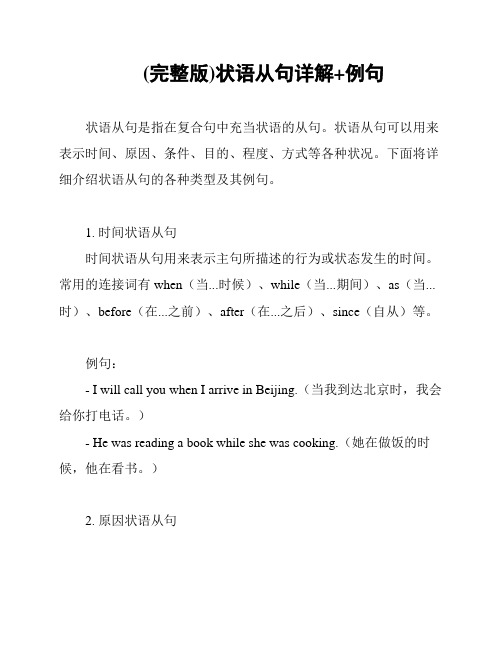
(完整版)状语从句详解+例句状语从句是指在复合句中充当状语的从句。
状语从句可以用来表示时间、原因、条件、目的、程度、方式等各种状况。
下面将详细介绍状语从句的各种类型及其例句。
1. 时间状语从句时间状语从句用来表示主句所描述的行为或状态发生的时间。
常用的连接词有when(当...时候)、while(当...期间)、as(当...时)、before(在...之前)、after(在...之后)、since(自从)等。
例句:- I will call you when I arrive in Beijing.(当我到达北京时,我会给你打电话。
)- He was reading a book while she was cooking.(她在做饭的时候,他在看书。
)2. 原因状语从句原因状语从句用来表示主句所描述的行为或状态的原因。
常用的连接词有because(因为)、since(因为)、as(由于)、for (因为)等。
例句:- I can't go to the party because I have to work.(我不能去参加派对,因为我得工作。
)- Since it is raining, we should stay at home.(由于下雨了,我们应该待在家里。
)3. 条件状语从句条件状语从句用来表示主句所描述的行为或状态的前提条件。
常用的连接词有if(如果)、unless(除非)、whether(无论)、provided(倘若)等。
例句:- If it rains tomorrow, we will stay indoors.(如果明天下雨,我们会呆在室内。
)- We can go shopping unless it is too late.(除非太晚,否则我们可以去购物。
)4. 目的状语从句目的状语从句用来表示主句所描述的行为或状态的目的。
常用的连接词有so that(以便)、in order that(为了)、lest(免得)等。
状语从句的连接词与用法解析
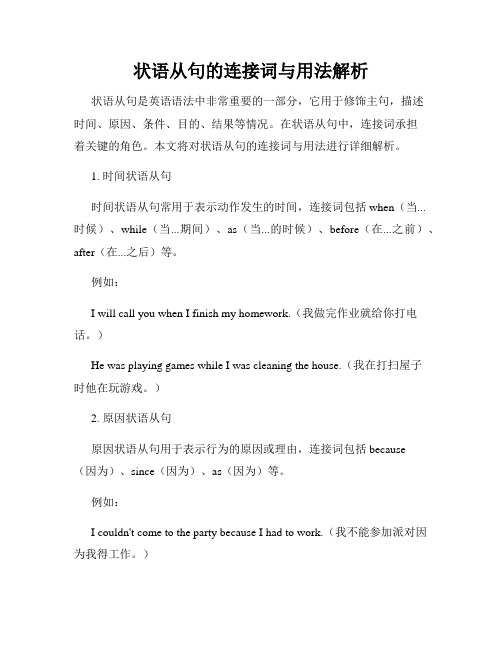
状语从句的连接词与用法解析状语从句是英语语法中非常重要的一部分,它用于修饰主句,描述时间、原因、条件、目的、结果等情况。
在状语从句中,连接词承担着关键的角色。
本文将对状语从句的连接词与用法进行详细解析。
1. 时间状语从句时间状语从句常用于表示动作发生的时间,连接词包括when(当...时候)、while(当...期间)、as(当...的时候)、before(在...之前)、after(在...之后)等。
例如:I will call you when I finish my homework.(我做完作业就给你打电话。
)He was playing games while I was cleaning the house.(我在打扫屋子时他在玩游戏。
)2. 原因状语从句原因状语从句用于表示行为的原因或理由,连接词包括because(因为)、since(因为)、as(因为)等。
例如:I couldn't come to the party because I had to work.(我不能参加派对因为我得工作。
)Since it's raining outside, we should stay indoors.(因为外面下雨,我们应该呆在室内。
)3. 条件状语从句条件状语从句用于表示某种条件下会发生的情况,连接词包括if (如果)、unless(除非)、provided that(倘若)、as long as(只要)等。
例如:If you study hard, you will pass the exam.(如果你努力学习,你会通过考试。
)I won't go swimming unless it stops raining.(除非雨停,否则我不会去游泳。
)4. 目的状语从句目的状语从句用于表示达到某种目的或意图的行动,连接词包括so that(以便)、in order that(为了)、lest(以免)等。
状语从句连词
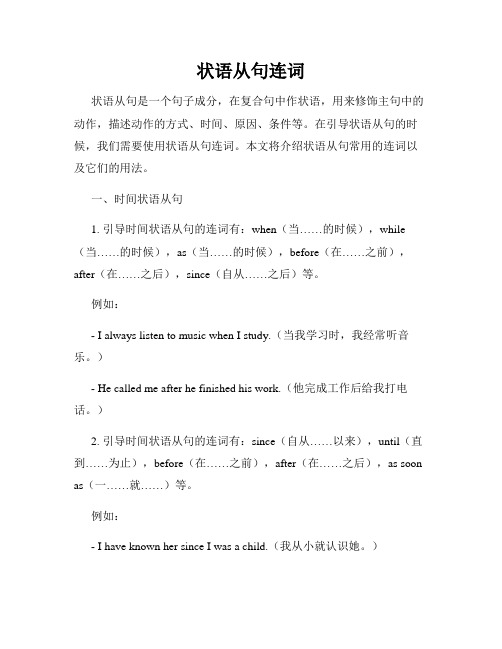
状语从句连词状语从句是一个句子成分,在复合句中作状语,用来修饰主句中的动作,描述动作的方式、时间、原因、条件等。
在引导状语从句的时候,我们需要使用状语从句连词。
本文将介绍状语从句常用的连词以及它们的用法。
一、时间状语从句1. 引导时间状语从句的连词有:when(当……的时候),while (当……的时候),as(当……的时候),before(在……之前),after(在……之后),since(自从……之后)等。
例如:- I always listen to music when I study.(当我学习时,我经常听音乐。
)- He called me after he finished his work.(他完成工作后给我打电话。
)2. 引导时间状语从句的连词有:since(自从……以来),until(直到……为止),before(在……之前),after(在……之后),as soon as(一……就……)等。
例如:- I have known her since I was a child.(我从小就认识她。
)- I will call you as soon as I arrive at the airport.(我到达机场后立即给你打电话。
)二、地点状语从句引导地点状语从句的连词有:where(在哪里),wherever(无论在哪里)。
例如:- He goes to the park where he can play basketball.(他去那个可以打篮球的公园。
)- You can find her wherever you go.(无论你去哪里都可以找到她。
)三、原因状语从句引导原因状语从句的连词有:because(因为),since(既然,因为),as(因为)。
例如:- She couldn't come to the party because she was busy.(她无法参加聚会,因为她很忙。
(完整版)高考英语专题复习状语从句(附答案)

高考英语专题复习状语从句(附答案)I. 考点分析状语从句可用来表示时间、地点、原因、目的、结果、条件、方式、比较和让步等。
1.时间状语从句1) 常见关联词有when, whenever, while, as, before, after 等。
2)注意not…until… 正常结构、倒装结构、强调结构、和until置于句首的用法。
He didn’t go to sleep until he had finished his homework. (正常结构)Not until he had finished his homework did he go to sleep. (倒装结构)It was not until he had finished his homework that he went to sleep.(强调结构)Until he had finished his homework he didn’t go to sleep. (until置于句首)3)表示“一……就……”的连词:once, as soon as, hardly/scarcely…when, no sooner…than, the minute, the moment, the instant, immediately, directly, instantly4)其他表示时间的短语还有:every time, next time, the day 等。
2.地点状语从句通常由where, wherever引导如:Where there is a will, there is a way.3.原因状语从句1) 通常由because, as ,since引导, 三者区别:because 语气最强,重在交待原因,以why引导的疑问句只能because用来回答;其前可用only, just等词强调;可用在It is…that…强调句型中。
从句中的连接词的用法和例句

从句中的连接词的用法和例句连接词是语法中的重要组成部分,它在句子中起到连接不同成分、组块或句子的作用。
正确使用连接词可以使句子结构更加清晰、语义更加准确,并能使文笔更加流畅。
本文将着重介绍从句中的连接词的用法和例句,并根据功能分类进行说明。
一、引导目的状语从句的连接词1. in order to / so as to这两个连接词均可以引导目的状语从句,表示为了达到某种目的。
其中,in order to 比较正式,so as to 比较口语化。
例句:- We need to work hard in order to achieve success.(我们需要努力工作以达到成功。
)- He wakes up early every morning so as to catch the first bus.(他每天早上都很早醒来,为了赶上第一班车。
)2. for the purpose of / with the aim of这两个连接词也可以引导目的状语从句,表示出于某种目标或动机。
例句:- He joined the language class for the purpose of improving his English.(他参加了语言班为了提高自己的英语水平。
)- The company launched a new marketing campaign with the aim of expanding its customer base.(公司开展了一项新的市场营销活动,旨在扩大客户群。
)二、引导原因状语从句的连接词1. because / since / as这些连接词均可用于引导原因状语从句,表示因果关系。
其中,because 比较正式,since 和 as 可以用于口语和书面语。
例句:- He couldn't attend the meeting because he was ill.(他没能参加会议是因为他生病了。
高中状语从句语法及例句
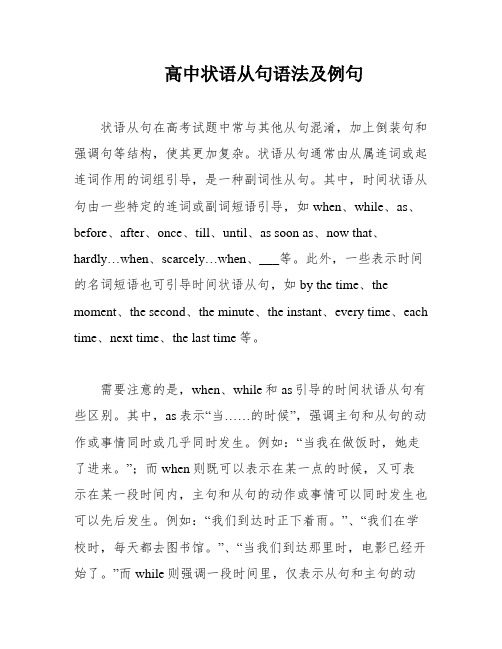
高中状语从句语法及例句状语从句在高考试题中常与其他从句混淆,加上倒装句和强调句等结构,使其更加复杂。
状语从句通常由从属连词或起连词作用的词组引导,是一种副词性从句。
其中,时间状语从句由一些特定的连词或副词短语引导,如when、while、as、before、after、once、till、until、as soon as、now that、hardly…when、scarcely…when、___等。
此外,一些表示时间的名词短语也可引导时间状语从句,如by the time、the moment、the second、the minute、the instant、every time、each time、next time、the last time等。
需要注意的是,when、while和as引导的时间状语从句有些区别。
其中,as表示“当……的时候”,强调主句和从句的动作或事情同时或几乎同时发生。
例如:“当我在做饭时,她走了进来。
”;而when则既可以表示在某一点的时候,又可表示在某一段时间内,主句和从句的动作或事情可以同时发生也可以先后发生。
例如:“我们到达时正下着雨。
”、“我们在学校时,每天都去图书馆。
”、“当我们到达那里时,电影已经开始了。
”而while则强调一段时间里,仅表示从句和主句的动作同时发生,并且有延续意义。
从句中的动词一般要用延续性动词,常用过去进行时态或一般过去时态。
当when表示一段时间时,它和while可以互换使用。
___。
He dozed off while reading.While they were watching TV。
I was ___.___ while it is available。
(Note: "while" here means "take advantage of")John sings while he works.As his hands fell。
状语从句的常见连接词
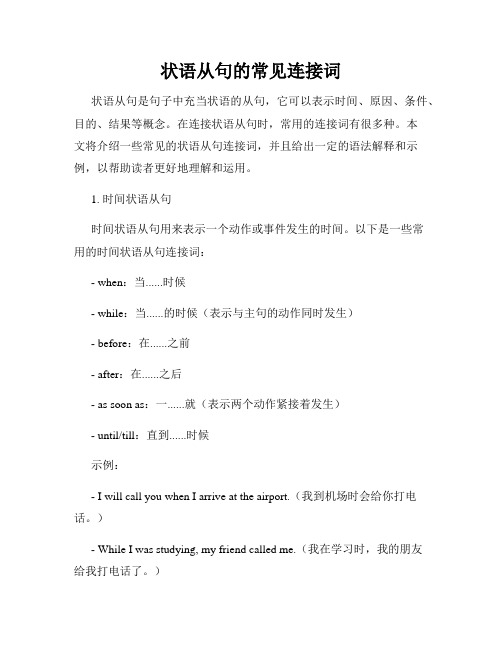
状语从句的常见连接词状语从句是句子中充当状语的从句,它可以表示时间、原因、条件、目的、结果等概念。
在连接状语从句时,常用的连接词有很多种。
本文将介绍一些常见的状语从句连接词,并且给出一定的语法解释和示例,以帮助读者更好地理解和运用。
1. 时间状语从句时间状语从句用来表示一个动作或事件发生的时间。
以下是一些常用的时间状语从句连接词:- when:当......时候- while:当......的时候(表示与主句的动作同时发生)- before:在......之前- after:在......之后- as soon as:一......就(表示两个动作紧接着发生)- until/till:直到......时候示例:- I will call you when I arrive at the airport.(我到机场时会给你打电话。
)- While I was studying, my friend called me.(我在学习时,我的朋友给我打电话了。
)- Before I go to bed, I always brush my teeth.(睡觉前,我总是要刷牙。
)- After he finished his work, he left the office.(他完成工作后,离开了办公室。
)- As soon as the rain stops, we will go outside.(一停下雨,我们就会出去。
)- She kept studying until she passed the exam.(她一直学习到通过考试为止。
)2. 原因状语从句原因状语从句用来表示一个动作或事件的原因,常用的连接词有:- because:因为- since:因为- as:因为- for:因为示例:- I couldn't go to the party because I was sick.(因为生病,我不能去参加派对。
状语从句连词及例句(原创)
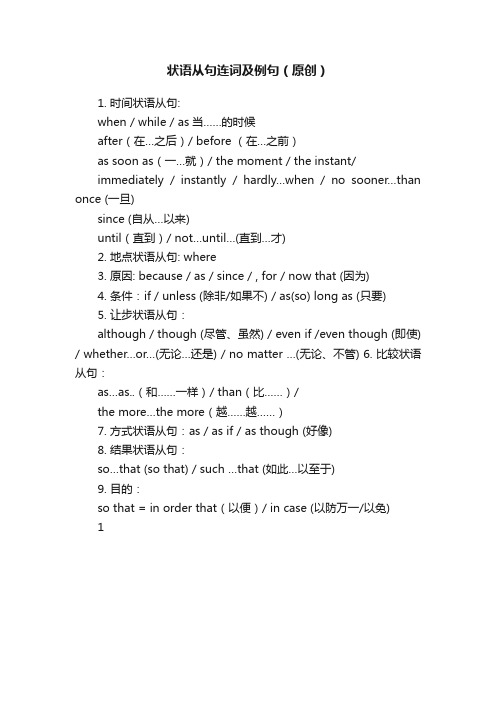
状语从句连词及例句(原创)
1. 时间状语从句:
when / while / as当……的时候
after(在…之后)/ before (在…之前)
as soon as(一…就)/ the moment / the instant/
immediately / instantly / hardly…when / no sooner…than once (一旦)
since (自从…以来)
until(直到)/ not…until…(直到…才)
2. 地点状语从句: where
3. 原因: because / as / since / , for / now that (因为)
4. 条件:if / unless (除非/如果不) / as(so) long as (只要)
5. 让步状语从句:
although / though (尽管、虽然) / even if /even though (即使) / whether…or…(无论…还是) / no matte r …(无论、不管) 6. 比较状语从句:
as…as..(和……一样)/ than(比……)/
the more…the more(越……越……)
7. 方式状语从句:as / as if / as though (好像)
8. 结果状语从句:
so…that (so that) / such …that (如此…以至于)
9. 目的:
so that = in order that(以便)/ in case (以防万一/以免)
1。
- 1、下载文档前请自行甄别文档内容的完整性,平台不提供额外的编辑、内容补充、找答案等附加服务。
- 2、"仅部分预览"的文档,不可在线预览部分如存在完整性等问题,可反馈申请退款(可完整预览的文档不适用该条件!)。
- 3、如文档侵犯您的权益,请联系客服反馈,我们会尽快为您处理(人工客服工作时间:9:00-18:30)。
1.条件状语从句:如果,只要,除非,倘若,条件是,唯一的条件是,以免,以防常用引导词:if, unless,特殊引导词:as/so long as(只要), only if(唯一的条件是), in case that(以防), on condition that 条件是providing/provided that(倘若), supposing that(倘若),1)Let's go out for a walk unless you are too tired.( 除非,若不;相当于if---not)即:If you are too tired, we’ll not go out for a walk.2)You may borrow my book as long as you keep it clean.(只要,表示条件的唯一性)3)Take your umbrella in case it rains.(以防---,以免---)4)I can tell you the truth on condition that you promise to keep a secret.(条件是---)5)Supposing it rains, shall we continue the sports meeting?( 如果,假如)6)He won't be against us in the meeting provided/providing that we ask for his advice in advance.( 假如,除非以……为条件)7)You will be successful in the interview once y ou have confidence.(一旦---就--)8)You will be successful in the interview only if you have confidence. 你只有有信心才会成功。
if only 要是。
就好了only if 唯一的条件是2. 时间状语从句:当。
时,前后动作的连贯,一边一边,在。
之前,在之后,自从,直到。
才,一。
就when, while, as, before, after, since , till, untilevery time,"一…就…"no sooner … than, hardly …when, scarcely … when ,instantly, immediately , directly, the minute, the moment, the second, the day ,the instant ,as soon as,1)When she came in, I stopped eating. (当---的时候,表示“瞬时动词”)2)While my wife was reading the newspaper, I was watching TV. (当---的时候,was reading是延续性的动词,was reading和was watching同时发生)3)I like playing football while you like playing basketball.(然而,表示“对比”)4)As we was going out, it began to snow.(as强调句中两个动作紧接着先后发生,而不强调开始下雪的特定时间)5)We always sing as we walk.(as表示“一边……一边”)6)Einstein almost knocked me down before he saw me.(“在---之前”或“----才”)7)My father had left for Canada just before the letter arrived.(“刚好在---之前”或“---就”)8)After you think it over, please let me know what you decide. (在---之后)9)I didn't go to bed until(till)my father came back.(“直到----才”,主句中的动词为非延续性动词)10)I worked until he came back. (“直到----才”,主句中的动词为延续性动词)11) Where have you been since I last saw you? (自从---)12) I will go there directly I have finished my breakfast. (一----就---,另外有immediately, instantly)13)The moment I heard the news, I hastened to the spot. (一----就---,另外有the instant, the minute,ect.)14)As soon as I reach Canada, I will ring you up. (一----就---)15)He had no sooner arrived home than he was asked to start on another journey. (一----就---,另外有hardly/scarcely----when---)16) By the time you came back, I had finished this book.(“到---时为止”,从句是一般过去时,主句是过去完成时。
)17)By the time you come here tomorrow, I will have finished this work. (“到---时为止”,从句是一般现在时,主句是将来完成时。
)18) Each time he came to Harbin, he would call on me.( “每当---的时候”或“每次”,复习each time, every time和whenever)3.有关时间状语从句的重点句型1)It will be four days before they come back. (It will be--- before---过很久才----)2)It won’t be f our days before they come back.( It won’t be---before---不久就---)2)It was not until the meeting was over that he began to teach me English.(“It was not until---that----”not until的强调句型)3)Not until the meeting was over did he begin to teach me English.( not until的倒装句型。
) 4) It is/has been five months since our boss was in Beijing.我们老板离开北京有五个月了。
(“It is/has been---since”自从---以来多长时间)5) Hardly had I sat down when h e stepped in.我刚坐下,他就进来了。
(“hardly/scarcely----when---”/同“no sooner ---than”注意时态的应用。
)4.原因状语从句(5个that)常用引导词:because=in that, since=now that(既然), as既然, for(补充说明)特殊引导词:seeing that, in that ,now that, considering that, given that(考虑到).1)The sweater shrank because it was washed badly. (强调“直接原因”)2)Since [As] we’ve no money, we can’t buy it.(由于)3) Since you are free today, you had better help me with my mathematics. (“既然”强调双方共知的原因,复习“now (that),seeing (that), considering (that), in that”)4)He could not have seen me, for I was not there.( for引导的原因状语从句并不说明主句行为发生的直接原因,只提供一些辅助性的补充说明, for引导的原因状语从句只能放于主句之后并且必须用逗号将其与主句隔开。
)5)The country is not strong because it is large. 国强不在大。
(“not ... because”结构中的not否定的是because引导的整个从句)6)Seeing that he was a hard worker, he achieved a lot7)The speech is all the important in that it was made by a man of authority8)Now that you stopped smoking, how much do you weigh?9)Considering that she is old, he sent her to a nursing home.10)Given that he has always been dreaming of visiting the great wall, it seems cruel not to take him to Beijing.5结果状语从句如此,以致于常用引导词:s o … that, such … that, 以致于特殊引导词:such that, to the degree that, to the extent that, to such a degree that,1) There is so rapid an increase in population that a food shortage is caused.(太---以至于)2) They are such fine teachers that we all hold them in great respect. (太---以致于)3) It was very cold, so that the river froze.(以致于)4) 注意状语从句与too….to..enough to…, so… as to结构的不同。
